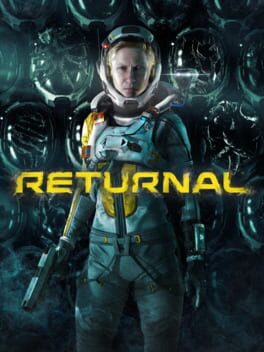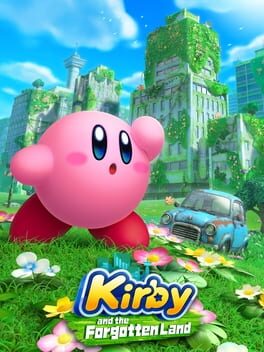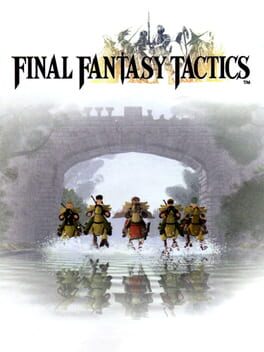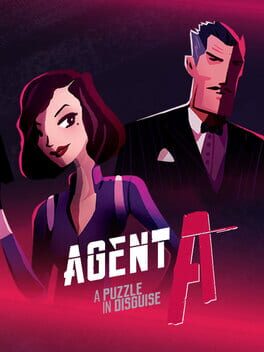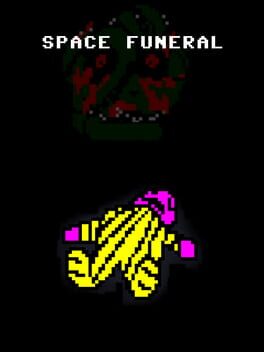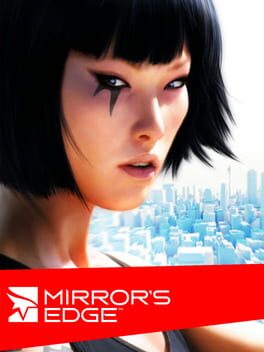sam_gray
2021
A roguelike bullet hell-fusion that I blamed at first for having an intense difficulty based on luck. But it’s really about risk management. You could keep exploring for that perfect gun and perk, but what if you run into a difficult enemy that sets back your precious health bar? You could risk a malfunction that handicaps you in a negligible way, but what if it’s terminal? Very demoralising to play for long periods of time, as every death stings - and unlike Dark Souls, there’s no easy route back to a boss, demanding your full concentration on every run. Also a brilliant, complicated system with no wasted parts, rewarding experimentation and attention to detail. Ends weak, and I wish it didn’t even bother with a narrative, with the stilted horror sequences and ultimate reveal that it’s all a dream or about trauma or something taking the bloom off the rose a bit.
2015
I really tried with this, and I can see why some find it so charming - the sidequests have an amusing, inventive wit, and the typical life-of-crime, fall & rise set-up is intelligently shaded. But there's also way too much time spent watching cutscenes, and the snippets of gameplay we get aren't quite compelling enough to make it worthwhile. The tactics in the brawls just boiled down to mashing buttons and occasionally using an unlimited supply of healing items. There's no tension to it. And the side bits - karaoke, flirting with the bowling receptionist, Mr. Shakedown - are fine, but heavily compartmentalised, like everything else. I wasn't expecting GTA, but there's a lack of flow here that I found unproductively claustrophobic. Will revisit down the road, maybe.
2019
This isn't entirely the game's fault, which plays well and makes good use of vertical movement, but I'm not particularly into this strain of indie games that posit themselves as aggressively nice - perhaps as a response to years of aggressively nasty AAA titles - at the expense of anything negative that might break the spell. The lower-caps, self-aware dialogue felt cutesy instead of human. Give me more moments like the rain-soaked graveyard, or the perilous journey through the snow, and maybe the self-congratulatory ending might feel less hollow.
Kirby by way of 3D Mario, replacing scattered power-ups with RPG-lite upgrades, some of which are ludicrously overpowered (the big sword that blocks all damage?) and others being simply, enjoyably ludicrous (a kind of suicide vest, duel-wielding pistols). Reasonably fun and imaginative, even if it rips off Mario Odyssey with the inanimate object possession and incongruously “realistic” setting, and shares that game’s same problem of over-cluttered busyness. Both suffer from the degradation of a corporate brand that once felt strange and singular (Kirby Super Star felt like it had been developed under the influence of LSD) and has now had the edges sanded off to appeal to a broader market. Also Kirby just isn’t as much fun to control as Mario, though he (?) is cuter, and this is the first mainline game in the series I’ve played that doesn’t feel insultingly easy. The boss fights might repeat themselves too much but there’s a care taken with attack variety and telegraphing that (hilariously) evokes Dark Souls, Kirby’s slow-mo dodge being an improbably cool cherry on that particular cake. My favourite in the series is still the golf one (Dream Course) - not sure if that’s controversial...
Found this off-putting at first, doing that high fantasy thing of referencing names before we can put them to faces, then presenting a dense thicket of betrayals and shifting allegiances that never quite satisfies. (Could be a PS1 translation issue, though I never had that problem with other Final Fantasies of this era, which are notably populated by a smaller number of intense personalities - this is recognisably a different authorial voice.) But the combat system - once it clicked - became incredibly addictive, a mind-boggling combination of Pokémon and chess. The big battle in the slums early on is a major obstacle that forces the player to pay attention to their players and every single move they make - and from then on, the game presents an impressive series of scenarios that display not just tactical but emotional variety, gamifying often complex human behaviour on its isometric stage. There’s a stage where you have to rescue a friendly character on a rooftop from assassins, and the character’s first instinct is to run headfirst into combat - which is frustrating (they die very quickly) until you realise that they’re emotionally affected by the events of the cutscene prior and therefore reckless, even suicidal. The game keeps finding ways to ground its tactical scenarios in concrete human realities, and if the magic evil stones business is ultimately less than satisfying, things do pay off with this devastating epilogue that’s tossed off after the end credits, but completes the narrative in a classically tragic sense. If this is a game about the human instinct to strategise - to acquire power, to overcome grief, to deny death - it concludes the same way WarGames does: the only winning move is not to play.
2024
Fun, but not remotely funny or satirical - beyond some witless Team America-style exaggeration with no punchlines - which makes its similarities to Starship Troopers surface level at best. It's also dispiriting how much this plays like a corporate rebranding of Earth Defense Force with all the charm sucked out - more "balanced" or whatever, but who cares? Above-average AAA slop is still slop.
2019
More so than any other Hideo Kojima game, this sees a divide between his talents as a video game developer and his original aspirations to be a film director. As a developer, I don't think he's ever been better. The gameplay loop is fantastic, creating a lonely world to be explored and populated by the ghosts of other players. The physics of parcel carrying are gratifyingly complex, and the environmental design is organic enough to make every journey and route feel original without ever becoming overwhelmingly dull or lacking in variation. The boss fights are unnecessary, but I think Kojima knows this - as it's such a leap into new territory, some elements of third-person action game design have been retained as a kind of compromise, to entice players who would never play an "art house" game.
Cinematically, it's more of a mixed bag. Along with Avatar: The Way of Water, it's certainly some of the most interesting use of motion capture I've ever seen. Léa Seydoux and Margaret Qualley are incredible, using their unique screen talents (Qualley used to be a ballerina, Seydoux is perhaps the most exciting actress to emerge in the past decade) to lean into the peculiarities of the process - treating it like black box theatre. And then there's Nicolas Winding Refn, giving an absolute void of a performance as Mr. Exposition, and Lindsay Wagner, whose thanklessly boring character the entire narrative hinges on. The Metal Gear games were appealingly episodic in their narratives, gaining a lot from the incongruous comparison between them and the American action movies that inspired them. Death Stranding is at its strongest in its early, individual character-focused chapters, but at a certain point it gets too lost in its own mythology, and Kojima's penchant for dream sequences overwhelms to the point of incomprehension. Still, easily the most singular and inspired game of its console generation. Bring on the sequel.
Cinematically, it's more of a mixed bag. Along with Avatar: The Way of Water, it's certainly some of the most interesting use of motion capture I've ever seen. Léa Seydoux and Margaret Qualley are incredible, using their unique screen talents (Qualley used to be a ballerina, Seydoux is perhaps the most exciting actress to emerge in the past decade) to lean into the peculiarities of the process - treating it like black box theatre. And then there's Nicolas Winding Refn, giving an absolute void of a performance as Mr. Exposition, and Lindsay Wagner, whose thanklessly boring character the entire narrative hinges on. The Metal Gear games were appealingly episodic in their narratives, gaining a lot from the incongruous comparison between them and the American action movies that inspired them. Death Stranding is at its strongest in its early, individual character-focused chapters, but at a certain point it gets too lost in its own mythology, and Kojima's penchant for dream sequences overwhelms to the point of incomprehension. Still, easily the most singular and inspired game of its console generation. Bring on the sequel.
2015
2010
2000
Rating's essentially meaningless, as the first two discs or so are peak Final Fantasy, and the back half sadly plummets into the convoluted nonsense that turns me off most JRPGs. What makes this franchise special is the way that gameplay is so often weaved into storytelling - there's narrative tension, for instance, in how this game introduces all its characters (from lowly thieves to high royalty - the Shakespearean aspirations couldn't be clearer), brings them together into a party - then uses big events like "the destruction of a city" to split them apart, jump through time, tell an episodic story through environment and NPC dialogue. The ATE system is amazing - being able to choose between lovely little scenes that deepen the characters and world without shouldering the burden of being "necessary" to the narrative makes them all the more impactful. And the characters are so vivid - Vivi and Steiner, in particular, are cartoonish types that deepen without betraying their established essence - the theatrical performances that bookend the narrative couldn't be more perfect for a game so adept at small-scale dramas.
So why do we have to travel between dimensions and defeat God? Again? Final Fantasy VII earned its planet-sized ambition, but it doesn't fit here - once you get to freely choose your party and the dull villains (never the best part of these games) take centre stage, all the air goes out of the balloon. It doesn't help that the game has virtually no interest in the fundamentals of the genre - battles are perfunctory (and incessant), the card game is stupider than ever, the side quests mostly involving catching frogs, etc etc. Perhaps VII's success trapped the company into catering to expectations, but I wish it hadn't. There's such mastery in its visual storytelling, tone, music - even translation this time around - that I wish it played to its strengths throughout.
So why do we have to travel between dimensions and defeat God? Again? Final Fantasy VII earned its planet-sized ambition, but it doesn't fit here - once you get to freely choose your party and the dull villains (never the best part of these games) take centre stage, all the air goes out of the balloon. It doesn't help that the game has virtually no interest in the fundamentals of the genre - battles are perfunctory (and incessant), the card game is stupider than ever, the side quests mostly involving catching frogs, etc etc. Perhaps VII's success trapped the company into catering to expectations, but I wish it hadn't. There's such mastery in its visual storytelling, tone, music - even translation this time around - that I wish it played to its strengths throughout.
A clunky game, like its predecessor, and yet even more confident, experimental, and detail-oriented that complaints about it being "uncomfortable" to play become totally insignificant. The structure is ambitious, to say the least, based around clones and copies; the sense of déjà vu is inherently game-like, the notion of the virtual disconnecting one from reality is incorporated into the game's fabric that is, itself, in an uncanny state of decay. I'm sure the brilliant boss fights, tight environmental design, and disorienting perspective shifts have all been analysed to death by this point, but what a thrill to experience even twenty years on, especially the moment when Kojima disregards the action climax to go full Adam Curtis with the motivation of the "villains". Only the Raiden/Rose dynamic falls short. Roll on Snake Eater.
2012
2008
2009
I'd give the edge to Dark Souls, which has one of my favourite game mechanics ever - the Estus Flasks - and that incredible, interconnected journey to Anor Londo, which takes the player down into a literal Hell and then back up to Mount Olympus to become a God. And I like the fact that Firelink Shrine is mere seconds away from danger, whereas it's a bit too easy to retreat into the Nexus here - even if the music changes and the murderous Yurt undercut its safety somewhat.
Still, what a game! Five distinct areas, overflowing with atmosphere, and with some of the best level design I've ever seen. Specialising in magic made some of the boss fights trivial, but getting to them is all kinds of incredible. Tower of Latria is an obvious standout, though all of them work together in harmony, and the player-created structure - which lets you move between levels, using the items you've found in one to help you out in the other - is so inspired. My favourite might actually be the swamp in the Valley of Defilement, which, by removing your depth perception and mobility, becomes infinitely terrifying. And even the ending is good, tempting you with the promise of more Souls for when you inevitably play through it again. I wish they hadn't bothered with a remake. It's basically perfect as it is.
Still, what a game! Five distinct areas, overflowing with atmosphere, and with some of the best level design I've ever seen. Specialising in magic made some of the boss fights trivial, but getting to them is all kinds of incredible. Tower of Latria is an obvious standout, though all of them work together in harmony, and the player-created structure - which lets you move between levels, using the items you've found in one to help you out in the other - is so inspired. My favourite might actually be the swamp in the Valley of Defilement, which, by removing your depth perception and mobility, becomes infinitely terrifying. And even the ending is good, tempting you with the promise of more Souls for when you inevitably play through it again. I wish they hadn't bothered with a remake. It's basically perfect as it is.
1996
The later ones fix the controls, the awkward camera, but this is still maybe my favourite 3D Mario platformer because every level is a puzzle with multiple solutions, a space to be explored instead of a route to follow directions. The atmosphere is palpable and strangely melancholy, abetted by one of the greatest soundtracks of all time. And Mario himself is a physical presence - he sounds like an easily terrified middle-aged man, all whoops and groans, and he plays like one too, e.g. using his whole body to turn. Which is funny, but also personable in a way that's since been lost. He's a corporate icon now instead of someone willing to endure immense physical pain in order to get laid.
